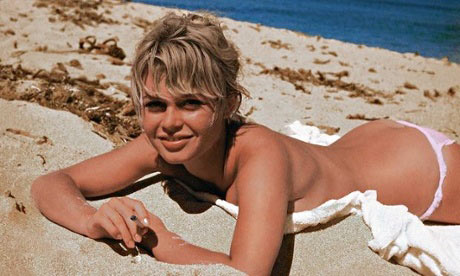|
查看原文
Is topless sunbathing over? It certainly is in France, according to French Elle, if the coverline on its new summer issue is to be believed: "La Fin Du Topless Sur La Plage?" – which translates, verbatim, to "Is this the end of toplessness on the beach?"
According to the magazine the answer is "yes", and the reasons are threefold. First, an increased concern over health and the dangers of skin cancer; second, the "pornified" perception of topless women (indeed Elle suggests the death of the monokini – ie swimming briefs – was linked to the idea that topless women are seen as "loose"); and third, the rise of breast-affiliated activism – chiefly Femen, who use their naked breasts as a means of attracting attention to various causes, and Free the Nipple, a recent campaign that encourages women to go topless to end the stigma surrounding female bodies. "Topless sunbathing was seen by women as a new freedom in St Tropez in the 1960s," says Elle. And now that they're covering up? It's a "worrying sign of a regression in the place of women".
Ever since Brigitte Bardot took off her top on the French Riviera in the 1960s, the correlation between topless sunbathing and women's liberation has been entrenched in French culture as a sign of true equality. Many others followed suit and the breast and beach were reclaimed. News that so few women are now going topless (just 2% of women under 35 said they did) seems extraordinary – and depressing.
But, according to two French women, it's more than a fear of skin cancer and political activism that has kept them covered up.
Alice Pfeiffer, a 29-year-old Anglo-French journalist (who, incidentallydoes sunbathe topless in Biarritz, Guéthary, Monaco and surfing resort Hossegor), thinks the decline is inextricably linked to social media: "Young women in their 20s do it less because they are aware that ... you can end up topless on your own Facebook wall."
Pfeiffer blames "pop-porn culture – Miley Cyrus to American Apparel, ie aggressive naked imagery of young girls" – for the shift in perception of going topless.
"Globalisation and Americanisation of women's portrayal and sexiness in France has pushed away gentle (and generally harmless) French eroticism towards porno, frontal, hyper-sexualised consciousness," she says. "Nudist, beach-like freedom is not what it used to be ... breasts no longer feel innocent or temporarily asexual."
Though probably universal, this attitude towards topless sunbathing has had the biggest impact in France. It is still the norm in Germany, according to one recent survey, which suggests almost a third of Germans and Austrians sunbathe naked. A straw poll in the UK also suggests it's equally de rigueur: one in six women we asked said they have or would sunbathe topless: "I don't think about skin cancer or being photographed or activism when I go topless," says Jess, 32 of north-west London. "I just want an all-over tan."
Valeria Costa-Kostritsky, a Paris-based writer, is 32 and sunbathes (not topless) in Britanny and C?te d'Azur. She says the change hasn't happened overnight: "I've never seen young women doing it loads. But some women over 50 do."
Pfeiffer agrees that the shift has been generational: "Family albums here can be a strange thing, as you flip through three generations of bourgeois bra-less women." But she maintains that "French women of most ages have, as far as I can remember, sunbathed topless."
What of the links between breasts and activism? Nudity as a political statement is no new thing – indeed, proverbially speaking, the personal has always been political – but, thanks to the internet, it has become a mainstay in the world of political activism: in France "showing your breasts wisely (a dodgy street will always be a dodgy street, so you have to act responsibly) can be a political statement," says Pfeiffer.
Costa-Kostritsky thinks the decline could be linked to health concerns, but these are less about skin damage and more about vanity: "Women of my generation have always been told that the sun was bad for our skin. But add sun damage to gravity and the fear is you won't have pretty breasts."
Pfeiffer agrees: "The ones who do it all look the same – slim and small breasts, which contributes to keeping a social order and aesthetic norm in place."
But both agree that the issue is not one of self-consciousness. "[French women] feel comfortable doing it!" says Pfeiffer. The real reason French women cover up, says Costa-Kostritsky, is because "it makes uncovering them for a lover more interesting".
|
查看譯文
祼露上身曬日光浴的時代終結了嗎?據時尚雜志Elle法語版報道:日光浴在法國的確是結束了。當然這要在其夏季新發行的刊物的封面內容屬實的情況下成立。“La Fin Du Topless Sur La Plage?”——完全按字面翻譯是“這會是沙灘祼露上身曬日光浴的終結嗎?”
該雜志的答案是“肯定”的,而原因有三:第一,對健康和皮膚癌危險的日益擔憂;第二,赤祼上身女性的“色情化”成份(實際上Elle解讀單件比基尼的消亡——即游泳褲——是與一種觀念相關聯的:赤祼上身的女性被視作是“淫蕩的”);第三、赤裸上身活動激進主義——主要是女權團體的興起。在應對各類事態時,她們用裸露上身的方式吸引注意力。還有近來升溫的“解放乳頭”(Free the Nipple)運動,即鼓勵女性祼露上身來終節有關女性身體的恥辱。“20世紀60年代,女性將祼露上身曬日光浴在圣特羅佩茲(St Tropez)視做一種全新的自由。”Elle寫道。而現在它們要遮掩起來了嗎?“這種跡象表明女性地位的倒退,令人擔憂。”
自從20世紀60年代碧姬?芭鐸(Brigitte Bardot)在法國里維埃拉(Riviera)脫去上衣以來,祼露上身曬日光浴與女性解放間的關聯就深植于法國文化中,成為一種真正平等的標志。其他人也紛紛效仿,胸部和海灘得到了解放。有消息稱,現在極少的女性會赤裸上身(只有約2%的35歲以下女性自稱會這樣做),這看起來蹊蹺,也令人沮喪。
但是據兩名法國女性稱,她們只不過是擔心皮膚癌和政治激進主義才把胸部遮掩起來。
一名29歲的英裔法籍記者愛麗絲· 法伊弗曾在比亞里茨(Biarritz)、蓋塔你(Guéthary)、摩納哥和沖浪勝地奧瑟戈爾(Hossegor)享受過祼露上身日光浴,她認為祼露上身曬日光浴人數的減少與社交媒體有著不可分割的關系:“年輕女性在她們20歲左右的時候很少袒胸日光浴,因為她們意識到……最終你會在自己的Facebook留言板上看到自己的赤裸上身照。”
法伊弗指責轉變袒露上身觀念的“流行的色情文化——即富有挑逗性的年輕女性裸照,如麥莉?賽勒斯(Miley Cyrus)為“美國服飾”(American Apparel)公司拍的代言照”。
“法國女性形象和性感的全球化和美國化將溫情的法國情色(通常說來是無害的)推向了色情、露骨和超性感刺激。”她說。“裸體主義者,沙灘自由已不再是曾經的模樣……胸部也不再感到單純或者暫時的無性。”
據最近一項調査表明:盡管這可能是普遍的,但是在法國對待赤裸上身曬日光浴的態度有著巨大的影響。在德國這仍舊常見。調查還表明,有三分之一的德國人和澳大利亞人仍舊裸體日光浴。英國一項民意調查也表明,這相當于一件必干之事:所問及的每六個女性中就有一人稱會或將袒胸日光浴。“我在袒露上身時,不會擔心皮膚癌或被拍攝,又或者激進分子的出現。”家住倫敦西北區的32歲的潔絲說道。“我只想要曬成一身小麥色。”
32歲的巴黎作家瓦萊里婭·考斯塔-科斯特麗奇斯基(Valeria Costa-Kostritsky)常在布列塔尼和蔚藍海岸(Cote d'Azur)的沙灘邊日光浴(不會赤裸上身)。她表示,這種變化不是在一夜間發生的。“我從未見年輕的女性那樣做。卻見過一些50多歲的人那樣。”
法伊弗對此表示贊同,也認為這是代際轉變:“當你翻閱三代中產階級的無胸罩女性的照片時,你會發現家庭相冊是件很奇妙的東西。”但是,她仍舊堅持“我所能記得的絕大多數那個年紀的法國女性會享受袒胸日光浴。”
胸部與激進主義有著什么樣的聯系呢?裸體作為一種政治性的聲明并不是件新鮮事——實際上,確切地說,私人的通常是具有政治性的——但是,由于有了互聯網,這變成了政治激進主義世界的支柱:在法國“裸胸可以用來發表政治聲明,前提是要明智——狗改不了吃屎,所以你必須謹慎行事。”法伊弗說。
考斯塔-科斯特麗奇斯基認為袒胸日光浴人數的減少可能與健康擔憂有關,但是這更多的是虛榮而不是對皮膚造成的損害。“我那一代的女性經常獲知陽光有害于我們的皮膚。而且,過度暴曬會造成下垂,并有威脅稱將不能擁有完美胸部。”
法伊弗贊同道:“所有那樣做的人看起來都一樣——苗條而且胸小,而這也成為當地的一種社會規約和審美價值觀。”
但是,二者都認為這個問題不是一種自我意識問題。“法國女性覺得那樣做很舒服!”法伊弗說。考斯塔-科斯特麗奇斯基認為,法國女性把胸部遮掩起來的真實原因是“這讓她們在愛人面前脫去上衣時更加迷人有趣。”
(譯者 xiongxiong1314 編輯 丹妮)
掃一掃,關注微博微信
 
|

